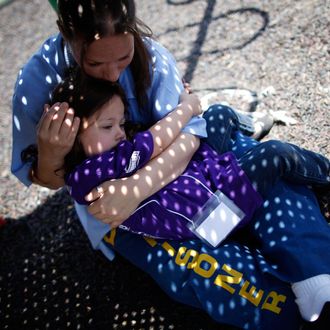
Let’s say you find out that kids who have a parent in jail, or one who used to be in jail, have worse outcomes — they’re more likely to have behavior issues, to not graduate high school, and so on. What would that tell us? It’s actually hard to know for sure — maybe it’s having a parent in jail that hurts kids, or maybe it’s mostly all the other stuff associated with incarceration in the first place: being poor, for example. It’s a classic example of how hard it can be to disentangle human behavior, to build clear stories about what leads to what.
As Alia Wong writes at The Atlantic, the researchers David Murphey and P. Mae Cooper have attempted to do that in a recent Child Trends report. In the post, she runs down what they found — a big area of the focus was the effects of parental incarceration on education — and includes some helpful graphs for understanding the scope of the problem and how it breaks down by race and income level.
Perhaps the most important concept here is that of “adverse childhood experiences,” or ACEs — as Wong puts it, “long-term, ‘toxic’ circumstances such as witnessing domestic or community violence, suffering from extreme poverty, or living with someone who’s mentally ill.” Not surprisingly, ACEs hurt kids in a myriad of ways. And even less surprisingly, Murphey and Cooper found a connection between parental incarceration and the number of ACEs a child had experienced:
Parental incarceration often acts as one such ACE because it causes a confusing, troubling loss of an attachment figure and involves ongoing contact with law enforcement, the corrections system, and child-welfare officials. But what Murphey and Cooper find is that having a parent in prison is likely to coincide with even more traumatic experiences: Children who’ve undergone parental incarceration suffer from 2.7 ACEs on average, according to their analysis of of the National Survey of Children’s Health, which lists 8 ACEs total. Children who haven’t experienced parental incarceration suffered from 0.7 ACEs on average.
One way to interpret this is that even a kid growing up in difficult circumstances — say, in a poor, high-crime neighborhood — may enjoy some level of security and stability. And then, one day, suddenly one of the most important people in his or her life has been whisked away. It’s no surprise that this is a traumatic experience for many kids.




